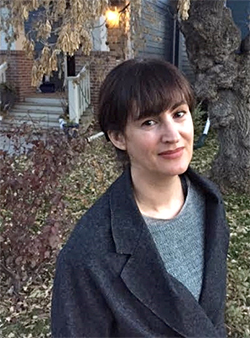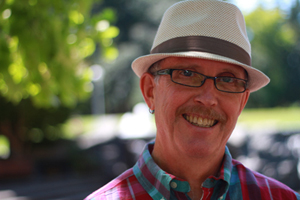The Strangeness in Us All:
John Barton in Conversation
with Jacqueline Baker

In "Down Burned Road," which appears in The Malahat Review's Autumn 2016 issue, Jacqueline Baker tells the story of Carrie and Yurig, and the first years of their marriage, which they live against a backdrop of rugged mountains, bears, and cougars in a house not easy to find if you don’t know where you’re going. She is the author of A Hard Witching & Other Stories and The Horseman's Graves. Her latest novel, The Broken Hours, is a literary ghost story about the final months of the life of horror icon H. P. Lovecraft. After years of living off grid in the British Columbia interior, Jacqueline Baker lives in the metropolitan centre of Edmonton.
Early in the story, Carrie describes herself as "amazing"—as if she were as amazed at herself as much as she assumes her friends to be—for ending up living in the middle of nowhere. Until she marries Yurig, she seems to have bumped along from one thing to the next. Before the story opens, she'd picked up shifts at the Log House Pub after losing her job at the local mill, only to walk away from it when asked why she'd floated free beer and burgers to regulars who were out of work. And then she immediately meets Yurig, The Euro, who supplies the pub with venison. Why did she marry Yurig?
I think you've hit on it exactly: Yurig was simply the next thing Carrie bumped along to. She is amazed at herself and at this life, but of course not in the informal sense of amazing (impressive) but rather she is surprised and wondering herself at where she's landed. Yurig turned up in the doorway, there was something about him she was drawn to, she could not have said herself just what it was as she waited in that dark alley behind the bar...did not, as she points out, even realize it was in fact Yurig she waited for. I think their courtship must have been as mysterious to her as it is to us.
Yurig is one of the most pleasurably inscrutable characters I have encountered in my recent reading. As Carrie observes, he "seemed to have come from nowhere, from no place, and no time in particular. He was attached, it seemed, to nothing." Why did he marry Carrie?
Ah, thank you, yes, mysterious Yurig. Someone else read this story and pointed out how unlikeable he is, but I didn't intend him that way. In fact, it's something I've heard before about my male characters – that they're terribly unlikeable. But I never feel this way about them and certainly don't intend them to come across as such. I will say I typically find myself gravitating toward writing about male characters than female characters. Again, who knows. As to Yurig, I suspect he and Carrie are not really all that different. I understand him as a kind of "take things as they come" fellow which, when you think of it, is not a great leap from a character who "bumps from one thing to the next." They just happened to collide.
The world that Yurig inhabits—and Carrie impinges upon—makes remote seem too inadequate a description. After the American from Portland, with the hipster-ish platinum eye-glass frames and the "woman's car," drives away, Yurig "darkly" says to Carrie, "We get one more neighbour…we go." He must have reasons for living the life he has chosen. What makes his world, and Carrie's place in it, so interesting to write about?
Lord, this would take an entire book to answer. I spent ten years living in this remote landscape and writing in it so it makes sense it would creep into my stories. But this story in particular was an attempt at looking at that isolation head on. That isolation, but also, and perhaps more interestingly, the kinds of people who are drawn to it. The Robson Valley, where I lived, was peopled with many whom I found to be enigmatic, mysterious, odd. I think these sorts of characters are endlessly interesting to write about. They contain depths which allow them to live in such an isolated way, to not really need anyone else, or perhaps more interesting still, to think they don't. And isolation can bring out the strangeness in us all, I suppose. Spending so much time alone, you become accustomed to operating with your guard down, to speaking and acting without a filter. I'm not sure this is Yurig exactly…but, then, I guess it is. He sees no need for the niceties of polite society. Not even with his wife.
The atmosphere in "Down Burned Road" is not only a product of the "remote" location of Carrie and Yurig's house, but of the "writerly" resonances I also catch. I know of your interest in H. P. Lovecraft and the story's mention of the Black Forest makes me think of the Brothers Grimm. Can you talk about how genre fiction and folk tales may have influenced you in the composition of this story?
You know, I can't escape them even when I try. Even when I'm writing "realism." They just creep in, or something in the story turns, sending me back there. I guess Grimm's fairy tales were the earliest stories I knew. Not from books, of which we had few, but retold to me by my mother. Fairy tales, folktales, Biblical stories. That's what I cut my teeth on. All dark, mysterious. We carry those first stories with us, I suppose, no matter the geography we physically in habit.
The name "Carrie" makes me think of the title character of Theodore Dreiser's novel, Sister Carrie. I'm not supposing it's intentional on your part, but the connection brought to mind naturalism, the school of writing for which Dreiser was an exponent. A quick Google search has reminded me that it was a branch of literary realism favoured by writers like Thomas Hardy and Émile Zola, and places observation over sentiment and emphasizes "the darker side of life"—though not the supernatural or the horrific, for which you have a fondness. Lost in thought while in town to do some Christmas shopping, Carrie has difficulty acknowledging her role in the bitter fight she'd had with Yurig three nights before: "She could barely think of it. Her part in it….without a cold ache in her gut that was part shame, but mostly, she had to admit it, fear. Not of Yurig. Or herself." What effect are you hoping to have on your readers by placing Carrie in a vulnerable life situation that you sketch out rather than explain?
What a fascinating question. I'd dearly love to lay claim to an intentional echo, but the resonance is purely coincidental. I've read Sister Carrie (and Hardy and Zola), though not recently, so any direct parallels are an accident of psychology or, more likely, the gift of a particularly keen and astute reader. It's a good reminder of what is most rewarding about writing, that connection between reader and writer, that is an exchange really. We often forget that, I think, how much the wise and canny reader brings to a piece of fiction. How there really is collaboration at the heart of what seems a very solitary art form. At any rate, Carrie has walked – knowingly – right into literal naturalism in her life with Yurig. She is vulnerable – to him, to the landscape, to herself. And, to my mind, characters who are vulnerable are always interesting. And, as a reader, I like my literature to be a bit like Yurig: sketched out rather than explained.
While reading and rereading your story, I also found myself thinking about the work of the late American novelist, Jim Harrison—especially his collection of novellas, Legends of the Fall. Like Harrison, you write with such deep feeling for place and for the people that inhabit it. Would you consider Harrison—or, more generally, the kind of fiction he wrote—to be an influence? Or, perhaps, it's better to suggest that I sense a fellow feeling between your and his approach to writing stories. How would you characterize that "kinship"?
Oh, Jim Harrison. How I love that you sensed this kinship, and what an honour it would be to believe in it. I stumbled across Dalva in my very early twenties, when I was just finding my way to literature – as a reader, I mean, not as a writer. That wasn't to come for several more years. From Dalva I went straight to Legends of the Fall, thinking all the time he was speaking to me, to me. What a gift that is when we stumble across such writers who speak to us of all that is truly familiar, one heart to another. And then, about five years ago, when I was still in the Robson Valley and writing and struggling, as one does, and feeling isolated, someone – my publicist at HarperCollins, I think – sent me a copy of his memoir, Off to the Side. I didn't read it right away. But one day several months later, when I was feeling particularly isolated and uninspired, I picked it up and sat all day in front of the woodstove in our log house in the middle of the wilderness with the snow falling all around and read about him in his wilderness, in front of his fire, read about his solitariness, and his loneliness, and his demons, about facing terrible tragedy at a young age, read about the sanctuary he found in being alone in the wilderness. And I closed the book and thought, I must write to him and tell him, Yes, yes, me too. And try to tell him all that he'd meant to me over the years, as a reader, as a writer. I kept meaning to.
And then one thing happened, and another, and then one day I read that he'd died. And I felt that I'd truly lost something, feel it even now. Not just the loss of a writer who'd meant so much to me, not the loss of more of his stories, but the loss of someone else in the world who I felt I understood a little bit and who would understand me. The insufferable solipsism, I know. But I felt real grief at his loss. And I went straight back to his memoir and those final lines that broke my heart, because they felt so true: "In Patagonia I've been giving the seven cow dogs up here at Hard Luck Ranch extra biscuits because I'm leaving in a few days. I'll drive to Montana and leave our dogs with my daughters, then fly to Michigan to help Linda pack up the farm for the move. I'll kiss the farm goodbye in various places, a real big woman who has been kind to me for over thirty years. In May I'll return to the Upper Peninsula to the cabin in order to fish and see the budding of the thousands of acres of dogwood and sugarplum bushes and trees. When I return to Montana I'll start a novel I've been thinking about for years, and explore the few areas of the state I haven't visited, keeping my sharp single eye out for fresh thickets for future use. I might need a thicket or two, though I've come to think of rivers as moving thickets, truly lovely and safe places. I don't feel an ounce of 'closure' about finishing this memoir. I'll just see how this life carries me. There's a lot left to be described. My life could have been otherwise but it wasn't."
* * * * * * * * *

John Barton









